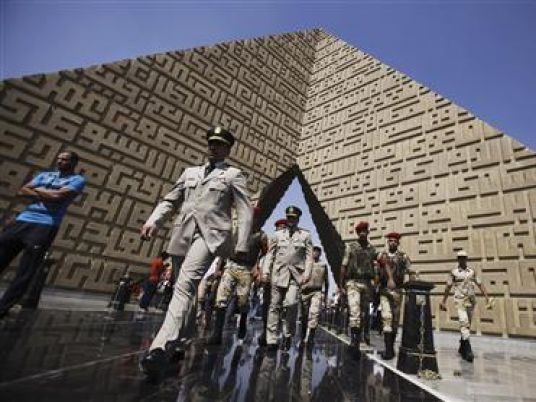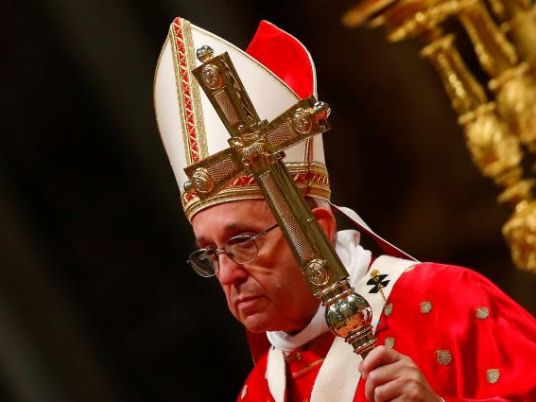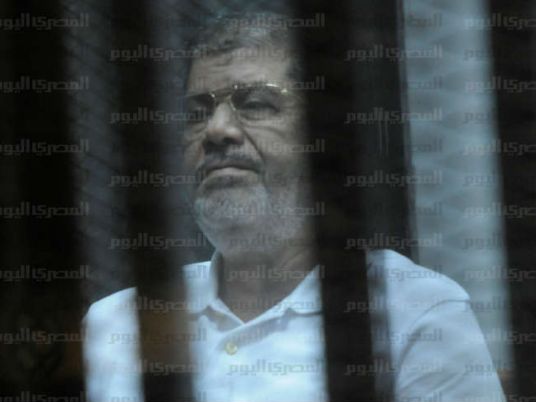Egypt's leading religious authority warned of "civil war" on Friday and called for calm after a member of the ruling Muslim Brotherhood was killed ahead of mass rallies aimed at forcing the president to quit.
"Vigilance is required to ensure we do not slide into civil war," the Al-Azhar institute said. In a statement broadly supportive of Islamist head of state Mohamed Morsy, it blamed "criminal gangs" who besieged mosques for street violence which the Brotherhood said has killed five supporters in a week.
There was no immediate sign of trouble as Islamists gathered round a Cairo mosque after weekly prayers to show support for Morsy. His opponents hope millions will turn out on Sunday to demand new elections, a year to the day since he was sworn in as Egypt's first freely elected leader.
"I came to support the legitimate order," said Ahmed al-Maghrabi, 37, a shopkeeper from the Nile Delta city of Mansoura whose hand bore grazes from street fighting there this week. "I am with the elected president. He needs to see out his term."
There was a mostly festive atmosphere in the hot sunshine, with vendors selling mango and cakes and banners flying.
Some opposition gatherings were also under way. A handful of protesters watched security men ringing the presidential palace, the focus for Sunday's Cairo rally. Morsy has moved elsewhere.
The army, which heeded mass protests in early 2011 to push aside Hosni Mubarak, has warned it will intervene again if there is violence and to defend the "will of the people." Both sides believe that means the military may support their positions.
The United States, which funds Egypt's army as it did under Mubarak, has urged compromise and respect for election results. Egypt's 84 million people, control of the Suez Canal and treaty with Israel all contribute to its global strategic importance.
In Alexandria, the second city, several thousand protesters marched along the seafront. Some fear the Brotherhood is intent on usurping the revolution to entrench its power and Islamic law. Others were complaining mainly about economic stagnation.
"I've nothing to do with politics, but with the state we're in now, even a stone would cry out," said 42-year-old accountant Mohamed Abdel Latif. "There are no services, we can't find diesel or gasoline. We elected Morsy, but this is enough."
"Let him make way for someone else who can fix it."
Al-Azhar, an ancient academy which traditionally maintains a distance from the political establishment, urged the opposition to accept Morsy's offer of dialogue and abandon demonstrations.
Senior Al-Azhar scholar Hassan El-Shafei was quoted by state media saying they should accept it "for the national good, instead of the insistence on confrontation."
Opposition leaders dismissed Morsy's proposal on Wednesday to include the fragmented opposition in panels to review the constitution and promote reconciliation, saying such offers led nowhere because the Brotherhood refuses to dilute its power.
A liberal activist on the march in Alexandria, Abdelrahman Abdel Wadoud, 27, said: "We are telling Morsy 'your last speech confirms your failure' … And on 30 June we will go out and will not leave until Morsy leaves."
The Brotherhood said one of its members was shot dead and four wounded at a provincial party office in the Nile Delta city of Zagazig overnight and blamed anti-Morsy activists, whom it portrays as a mixture of secularists and Mubarak loyalists.
Morsy and the Brotherhood accuse loyalists of the old regime of being behind violence and of thwarting their efforts to reform an economy hobbled by corruption.
In his speech, Morsy denounced his critics but admitted some mistakes and offered talks to ease polarization in politics that he said threatened Egypt's new democratic system. But opposition leaders said their protests on Sunday would go ahead.
"Dr. Mohamed Morsy's speech of yesterday only made us more determined in our call for an early presidential vote in order to achieve the goals of the revolution," the liberal opposition coalition said after its leaders met to consider a response.
"We are confident the Egyptian masses will go out in their millions in Egypt's squares and streets on 30 June to confirm their will to get the 25 January revolution back on track."
It is hard to gauge how many may turn out but much of the population, even those sympathetic to Islamic ideas, are deeply frustrated by economic slump and many blame the government.
Previous protest movements since the fall of Mubarak have failed to gather momentum, however, among a population anxious for stability and fearful of further economic hardship.



